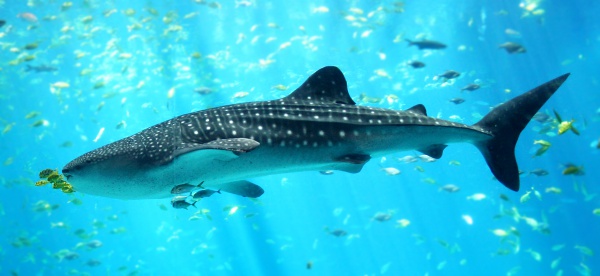Facts About Whale shark
The whale shark, a gentle giant of the ocean, holds the distinction of being the largest fish species in the world. The largest recorded specimen reached an impressive length of 18.8 meters. Despite its colossal size, the whale shark is a slow-moving filter feeder, primarily consuming plankton and small fish, which makes it completely harmless to humans.
Classified in its own unique family, Rhincodontidae, and genus, Rhincodon, the whale shark thrives in warm, tropical waters across the globe. They are commonly found swimming in the open ocean but occasionally gather near coastlines with abundant food sources. Officially recognized as a species in 1828, whale sharks are easily identified by their enormous mouths, distinctive skin patterns, and prominent ridges along their sides.
Whale sharks are proficient travelers, migrating across vast distances and diving to impressive depths. Their mode of reproduction is particularly fascinating: females give birth to live young, a process known as ovoviviparity. These ocean giants can live up to 130 years and, as noted, grow to over 18 meters in length. Their diet includes plankton, fish eggs, and small marine creatures, and they utilize a combination of ram filtration and active suction to feed.
Despite their enormous size, whale sharks are remarkably docile, posing no threat to humans. Divers often cherish encounters with these majestic creatures in the wild. However, the whale shark population is under threat and is classified as endangered by the International Union for Conservation of Nature (IUCN). They face significant dangers from fishing, accidental capture in fishing gear, and collisions with boats. Conservation efforts are in place, including protections under the CMS Memorandum of Understanding on the Conservation of Migratory Sharks and regulations by CITES.
In some regions, whale sharks are housed in large public aquariums. Given their size and unique feeding habits, these gentle giants require specialized care in captivity. The success of keeping them in such controlled environments has varied, with some individuals living for many years under meticulous care.
Culturally, whale sharks hold a special place in many areas. They are known by various names and even appear on currency in some countries. Human interactions with whale sharks are carefully regulated to ensure their safety and well-being, ensuring that these magnificent creatures continue to grace our oceans for generations to come.

 Peru
Peru